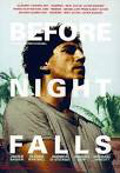
Directed by
Julian Schnabel
133 minutes
Rated M
Reviewed by
Jen Jamieson

Before Night Falls
Synopsis: Reinaldo Arenas (Javier Bardem), a boy from the Cuban countryside with a gift for writing and a passion for life, leaves his mother and ventures into Havana just after the revolution has swept Castro to power. He earns some early success; but his homosexuality soon brings him to the attention of the authorities. His second novel is banned and the forces of the totalitarian state are soon brought to bear on the dissident writer.Javier Bardem in an Oscar nominated performance is mesmerising as Reinaldo Arenas, a real-life Cuban writer who came of age in the post-revolutionary Cuba of the 1960's. Apparently, Cuba was then a steaming mix of hedonistic decadence and socialist commitment, as well as extreme anti-homosexual bias.
'
Director Julian Schnabel based his film on Arenas' personal memoirs of the same title, 'Before Night Falls', published in English in the early '90's. This is important to keep in mind, for when viewing the film it is easy to leave with strong anti-Castro sentiment. Obviously Arenas has real reasons considering his internment and harsh treatment by the Cuban government, but for me, Schnabel's film fails by not exploring the total political picture of Cuba. Indeed, I don't think there was a single country in the world where homosexuality was not under persecution. Let's remember that Pride and Stonewall did not happen until the late 1970s/early '80s. That said, the film is a beautiful portrait of an artist who somehow managed to persevere against all the heartache and struggle, both political and personal in his short life.
Cuba is unveiled in slow languid images, unravelling from the poverty of colonial countryside to revolutionary cities. The dialogue moves in seamless rhythm from Spanish to English. At times we hear Arenas' poetry in voiceover. Many reviewers have complained about the heavy accents and/or subtitling as the languages shift, but is there really a need to hear each word definitively? Words, both spoken and written, all form part of a lush soundscape that complement the visual.
This is a film made by a painter, and Schnabel uses a painter's eye to give us an impressionistic narrative that traces Arenas from early childhood to his exile. At times the romanticised jungle beauty of Cuba is perhaps too overwhelming, but this submersion is also rewarding. The film is a dreamlike journey that seems to complement Arenas' poetry. And how could I forget the bizarre cameos from Sean Penn and Johnny Depp, bordering on self-indulgent, but still appealing..
While the film doesn't explore a more objective portrait of Arenas and Cuba, it is nevertheless a dazzling sketch of human beauty and personal courage. Film is a powerful medium, and, I tend to (unrealistically or idealistically) believe that film-makers have some sort of responsibility to educate audiences and present an overview that allows for divergent opinion to flourish.
Addendum: Whilst I substantially agree with the above assessment, particularly from the time of the (self-indulgent) appearance of Johnny Depp the film begins to bog down in episodic detail and loses sight of what up until then had been its strength - the stimulating presentation of Arenas' writing. A footnote for film buffs: Arenas arrived in America under the same circumstances as Brian De Palma's Tony Montana.

Want more about this film?


Want something different?




